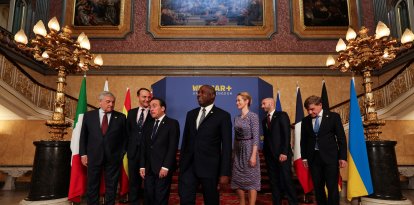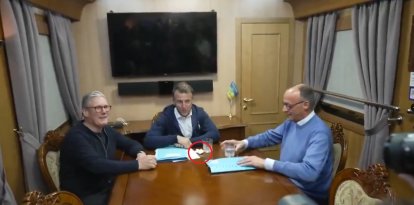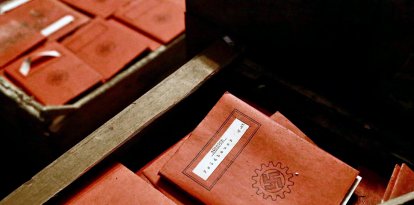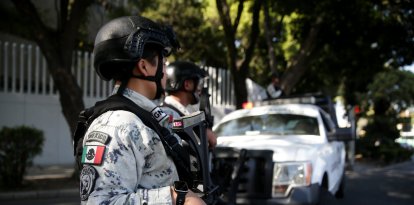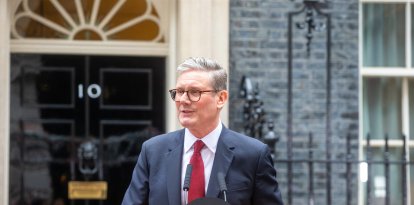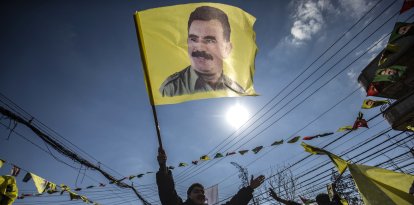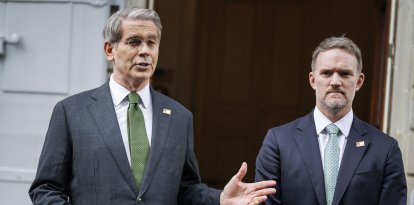‘Ali Baba and the Forty Thieves’: Palestinian leadership has been stealing money donated by the world for decades
The Emirati foreign minister used the name of the famous story to describe the Palestinian leaders. Both the Palestinian Authority and Hamas have based their management on taking over international economic aid to finance terrorism and the luxurious personal lives of their leaders.
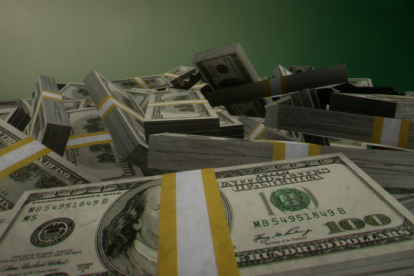
Dinero/Wikimedia Commons
At the end of April of this year there, was a heated interaction between Emirati Foreign Minister Abdullah bin Zayed Al Nahyan and Secretary General of the Organization for the Liberation of Palestine Hussein al-Sheikh during a meeting in Riyadh, Saudi Arabia, between U.S. Secretary of State Antony Blinken and a group of senior Arab officials, revealed Axios.
The meeting, which took place on April 29 on the sidelines of the World Economic Forum summit, was attended, in addition to the officials already mentioned, by the foreign ministers of Saudi Arabia, Egypt, Jordan, Qatar and Kuwait, in order to discuss a joint post-war strategy between Israel and Hamas in Gaza.
As revealed by sources close to the matter to Axios, the heated discussion broke out after al-Sheikh said that the Palestinian Authority (P.A.) was carrying out reforms and formed a new government, as requested by the United States. However, the official protested because, according to him, the Palestinian authorities in the West Bank were not receiving enough political and economic support.
Upon hearing al-Sheikh's comments, bin Zayed expressed that no major reform had actually occurred within the Palestinian Authority, and even took aim at Palestinian officials, whom he called "Ali Baba and the Forty Thieves." The Emirati minister also described the P.A. leaders as "useless", which is why, he maintained, "replacing one with another will only lead to the same result."
"Why would the UAE provide assistance to the Palestinian Authority without real reforms?" the UAE official asked.
After hearing harsh criticism against the Palestinian Authority, al-Sheikh shouted at the Emirati minister, stating that no one will dictate to his government how it should carry out reforms, sources revealed to Axios.
Despite the attempts of others present to calm both parties, al-Sheikh and bin Zayed continued shouting at each other, so the Emirati left the premises visibly upset.
The sources added that after the harsh exchange, Jordanian Foreign Minister Ayman al-Safadi also left the meeting and later returned with bin Zayed, who apologized to Blinken for having to witness the exchange he had with the Palestinian official.
It should be noted that tensions between the United Arab Emirates and the Palestinian Authority are not new, since the relationship between Emirati President Mohammed bin Zayed and Palestinian President Mahmoud Abbas has not been good for some years.
Mohammed bin Zayed has accused the Palestinian leadership of being corrupt, while Abbas does not forgive the Emirati government for normalizing relations with Israel in 2020. Additionally, Mohammed Dahlan, the Palestinian leader's main political rival, is one of the UAE president's top advisors.
Did the Emirati foreign minister rush to accuse the Palestinian leadership of being corrupt? The truth is that corruption has been a factor that has characterized both the Palestinian Authority and Hamas governments for decades. Both leaderships have taken advantage of the money that came (and comes) from around the world to allocate it to terrorist activities against Israel and the luxurious personal tastes of those around them.
Yasser Arafat, the creator of the corrupt Palestinian leadership apparatus
In 1999, the British newspaper Sunday Telegraph revealed that a group of hackers attacked the computers at the headquarters of the Palestine Liberation Organization (PLO) in Tunisia, revealing that this group led by Yasser Arafat, then-president of the Palestinian Authority, had financial assets of $5 billion.
The PLO's assets were held in several bank accounts in Zurich, Geneva, New York, and smaller ones in North Africa, Europe, and Asia. According to the article, all accounts were in the name of Yasser Arafat and a limited number of people around him.
The British newspaper also revealed that the PLO had bought shares in trading companies on the Paris, Tokyo and Frankfurt Stock Exchanges, as well as in the German car manufacturer Mercedes Benz. The organization also bought real estate assets in European capitals, such as London, and shares in several airlines.
In 2003, a year before Arafat's death, an International Monetary Fund audit revealed that the Palestinian leader diverted $900 million in public funds to a bank account in Switzerland, which he controlled.
Most of the diverted money was invested in Palestinian assets, both in Gaza and the West Bank and abroad.
Arafat even ranked sixth, just one place below Queen Elizabeth of England, in the Forbes ranking of the wealth of kings and despots published in 2004. According to the magazine, the Palestinian leader had a fortune of $300,000,000.
However, at the time, Israeli intelligence claimed that Arafat had amassed a fortune of around $1 billion.
However, it is likely that the Palestinian leader had even greater wealth. At statements made for the Argentine newspaper Clarion In 2004, shortly after Arafat's death, the late Jaweed al-Ghussein, a former PLO finance minister who lived in exile in London since 1996, said that at that time, Arafat's personal investments and those of the PLO abroad amounted to between $3 and 5 billion dollars.
It should be noted that Arafat received money from three different sources: external humanitarian aid, Israeli tax transfers and the profits of companies controlled by the Palestinian Authority.
The corruption of the Palestinian Authority under Mahmoud Abbas
In 2006, when Hamas defeated Fatah (led by Mahmoud Abbas) in the Palestinian general elections, it was said that the result had occurred, in part, due to the corruption of this party. However, as we will see later, the leadership of the terrorist group, which currently rules in Gaza, is far from being an example of honesty.
It should be noted that in 2007 there were strong clashes between both factions, in which dozens of combatants from both sides lost their lives.
P.A. corruption is continuous and systemic. There are many cases in which the government has robbed the population for the pleasures of some officials or in which money donated by various countries has been given to the families of terrorists who died or were arrested after committing attacks against Israelis. However, an investigation published by the Jerusalem Center for Public Affairs in 2020 best reflects how the corruption apparatus of Mahmoud Abbas's Palestinian Authority supposedly works.
The center indicated that Yasser Jadalla, former director of the political department of the office of President Mahmoud Abbas, revealed, in a video posted by Palestinian agencies in 2020, was involved in corruption cases related to the theft of funds that came to the Palestinian Authority from international organizations. It detailed that these resources were transferred to personal accounts.
Jadallah claimed in the video that all Palestinian Finance Ministry funds that came from the European Union and Arab countries were mostly transferred to the Palestinian president’s office and then to secret accounts known only to three people: Abbas, the head of his office and the director general of finance of the Office of the President of the Palestinian Authority.
The former Palestinian official, who is currently living in Belgium after his request for political asylum was approved, added that as soon as these funds entered the office's accounts, they suddenly disappeared and were transferred to accounts with fictitious identities, including accounts with the names of Abbas's grandchildren.
"We have conveyed this information to European parliamentarians," Jadallah said in the video.
Jadallah alleged that two Palestinian security personnel tried to assassinate him and that he was kidnapped twice to pressure him not to reveal anything about corruption in the Palestinian Authority.
Following the complaints made by Jadallah, senior Fatah officials denied the former official's claims. Abbas, of course, has also rejected the corruption accusations involving him and his children. His entourage has stated that this is fake news spread by his political opponents and Israel to discredit him.
Hamas corruption
While Gazans continue to suffer from poverty and the war started by Hamas with the massacre of Oct. 7, and while the terrorist group uses them as human shields, the leaders of this organization live in luxury, far from Gaza.
As revealed by The New York Post in an article published in November, Hamas's three top leaders alone accumulate a staggering total of around $11 billion and enjoy a multimillionaire life in Qatar.
Hamas has an office in Doha, the capital of Qatar, and Hamas leaders Ismail Haniyeh, Moussa Abu Marzuk and Khaled Mashal maintain a luxurious lifestyle in the emirate.
Haniyeh, 61, is the head of the Hamas politburo and was prime minister of the entire Palestinian territory after the 2006 elections, until he was removed from office a year later, as a result of the conflict with Fatah. However, he continued to rule the Gaza Strip until 2017 before moving to Qatar.
Haniyeh, a father of 13 children, has a fortune of more than $4 billion, according to German newspaper Bild.
The terrorist leader has been photographed with his two adult children, Maaz and Abdel Salam in luxury hotels in Qatar and Turkey.
Maaz Haniyeh is known as “The Father of Real Estate” in Gaza for his collection of houses and buildings and lives in pure luxury in Turkey. Last year, he obtained a Turkish passport, according to Israeli media.
Khaled Mashal, 67, is the former head of Hamas's political bureau. He fled Damascus to escape the Arab Spring in Syria and, like Haniyeh, now lives in Qatar. From there, Bild reported, he handles real estate and financial transactions for Hamas.
The newspaper added that when he fled Syria, he is estimated to have taken $1.5 billion with him from Hamas headquarters in Damascus. The American embassy in Israel estimates his net worth at $4 billion.
Mousa Abu Marzouk, 72, is another of Hamas's most important leaders. He is considered second in command within the group and is a type of foreign minister.
Marzouk lived for 14 years in the United States, where he was arrested in 1995 for participating in activities supporting terrorism. After two years in prison, the Palestinian leader was deported and moved to Jordan, then to Syria and in 2012 to Egypt. He currently resides in Qatar.
Bild estimated his fortune at $2 billion, while the Israeli embassy in the United States estimates it at $3 billion.
According to a report published in late 2023 by the Foundation for the Defense of Democracies, Qatar gives Hamas between $120 and $480 million a year. However, the emirate is not the only source of income that Hamas leaders use to attack Israel or live in luxury far from Gaza. From 2021 to 2023, the U.N. granted it around $400 million. Much of that money came from the Biden administration, which has also provided $1 billion to UNRWA, the United Nations agency for Palestinian refugees, since 2021.
It should be noted that several UNRWA employees have been accused of having participated in terrorist activities against Israel, including in the Oct. 7 massacre, and of indoctrinating children in hatred of Jews in the schools it manages.
In addition to the money received by Qatar and the U.N., a report by The Daily Mail published in November 2023 noted that Hamas also has been able to raise its own income, taxing goods that move through a sophisticated network of tunnels that avoid passing through the border crossing with Egypt, managing to bring food, medicine, fuel, cash and, of course, weapons to Gaza.
As of 2021, Hamas collected over $12 million per month in taxes collected on Egyptian products imported into Gaza.
Iran, of course, also contributes to the growth of the wealth of Hamas leaders, since it is one of the largest donors to the terrorist group. It is estimated that Tehran sends this and other Islamist organizations around $100 million annually.
Turkey has also supported Hamas. Although the Turkish government claims that it only supports the political wing of the group, the truth is that Ankara has been accused of financing its terrorist activities.
‘These types of people cannot represent our people’
Mohammad Massad, a former Palestinian terrorist turned peace activist who currently lives in Israel, said in an interview for Ynet Español in 2020 that he began distancing himself from the Palestinian Authority in the 1990s due to “all the corruption” in the leadership. “I came to the conclusion that these types of people cannot represent our people, which is why I began to oppose the corrupt leaders of the P.A.,” he added.
His opposition to the Palestinian government cost Massad dearly from the beginning. “They invented a case in which I was accused of collaborating with Israel. This happened in 1996, but it continues to happen to this day. Anyone who opposes them, they invent a case, they accuse them of being a traitor who collaborates with Israel, they imprison them and torture them in prison,” he stated.
Massad has also repeatedly accused Mahmoud Abbas and Hamas of corruption. In an interview with Voz Media in March of this year, he stated that international aid “does not reach the people,” but is taken over by the Palestinian leadership .
RECOMMENDATION


